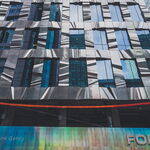Article - Corktown bubbles up
Corktown bubbles up
TheStar.com - Athome - Corktown bubbles up
Retrofits and new construction on tap: `A lot of people look for modern living in an historical setting'
April 28, 2007
Shelly Sanders Greer
Special to the Star
Corktown, one of Toronto's most historic areas, is poised for massive restoration and redevelopment.
Adjacent to the Distillery District and running from the Don River in the east to Berkeley St., this area was once a gathering place for Irish immigrants – many from County Cork – fleeing the potato famine.
In fact, Toronto's population doubled with the Irish arrivals in the mid-1800s, leading to horrible living conditions, historian Bruce Bell writes in an article for the Corktown Residents & Business Association newsletter. "Teeming slums bursting with one-room shacks holding 30 people each began to spring up in back alleys of Corktown."
The area is central to the history of Toronto. Upper Canada's first Parliament buildings were at Front and Parliament Sts. until being torched during the War of 1812. Corktown also had Toronto's first Roman Catholic church, the Dominion Hotel, and was one of the entry points for some slaves escaping the United States by boat via the Underground Railroad.
The Enoch Turner Schoolhouse, at 106 Trinity St., also figured prominently in Corktown history. A block east of Parliament and south of King St. E., it was built in 1848 by brewer Enoch Turner, who started offering classes at no cost the following year. It was the first free school in Toronto and is one of the oldest continuously operating buildings in Toronto, according to the website (enochturnerschoolhouse.ca) run by a not-for-profit organization that maintains the building.
JoAnne Nelson, a local resident for seven years and the owner of Gallery 402, a gourmet cafe at 402 King St. E., knows some of the area's local history.
"The building next to my business was a small grocery store called W.G. Cork's where Theodore Pringle Loblaw (co-founder of the supermarket chain) had his first job at 17,'' she says, adding that Loblaw apparently made "$3 a week clerking."
In the early 20th century, Corktown became home to many of the city's Macedonian immigrants, something Michael Ondaatje wrote about in his 1987 novel In the Skin of the Lion.
As a raw, working-class area, Corktown became a mix of industrial warehouses, workers' cottages, and British-style row housing on Bright St.
Corktown's historical architecture and its prime location near the business district, theatres and expressways are why Streetcar Developments has moved into the area and is embarking on an extensive redevelopment plan.
"A lot of people look for modern living in an historical setting," says Les Mallins, president of Streetcar Developments. "This is a great area surrounded by regeneration areas like Regent Park, King and Parliament and the West Donlands. We can't leave Corktown behind as a place people pass through. Corktown deserves to be a destination."
Mallins says his company's comfort level for redevelopment in Corktown grew substantially when an earlier project, at 19 River St., sold 32 of the 36 units on the opening weekend. This project was the restoration of the Queen City Vinegar Company building, which will be ready for occupancy near the end of this year.
The next project involves two phases. The first will be new construction of single-storey, loft-style condos on three parcels of land – 52 Sumach St., 549 and 569 King St.
Each building will have 40 lofts, and there will also be three townhomes and underground parking. An amenity space at 52 Sumach St. will include a lounge with wide-screen TV, a fully equipped kitchen, a large outdoor patio and a fitness centre. Prices will range from the low $180,000s to the $700,000s for the condos and townhomes.
"These townhomes will be built next to 130-year-old dwellings on Bright St., a single direction, narrow street," Mallins says. "We've met with every neighbour affected and they are all glad to see the townhomes instead of the trucks coming through to park now."
Phase two will take place across the street from the first phase, and involves retrofitting an old three-storey warehouse to accommodate 150 suites. Inside, there are 12-foot wooden ceilings and exposed brick. Mallins says that once sales of Phase 1 reach 80 to 90 per cent, Streetcar will start on phase two.
"We will also be replacing empty industrial offices on the street level with a retail corridor that will add life to Corktown as well," Mallins says. "In Corktown, people will (be paying) $40 a square foot less to live than in other areas, so this is a huge opportunity."
Pam McConnell, councillor for Ward 28, which includes Corktown, for the past 13 years, says she is excited about the upcoming transformation.
"To me, Corktown has always been unique because of the historical significance and its neighbourhood of streets," she says. "Each street has its own culture and history. But these streets are also isolated from each other. Streetcar is acting as a catalyst in uniting these streets together, bringing cohesion, and allowing Corktown to stand as a strong community."
McConnell says she expects to see more families moving to Corktown, which will become "connected to the Distillery District and the West Donlands. It will become a more vibrant, larger neighbourhood with parks and community centres.
"Streetcar has looked carefully at the fabric of the lots they have. They are city builders looking at ways to fit in rather than stick out."
Streetcar Developments has other projects on Queen St. east of the Don and in the Beach neighbourhood.
The Corktown sales office is now open; layout and feature details will be released soon. To register, go to streetcar.ca, phone 416-686-9199 or visit Streetcar's offices at 569 King St. E




